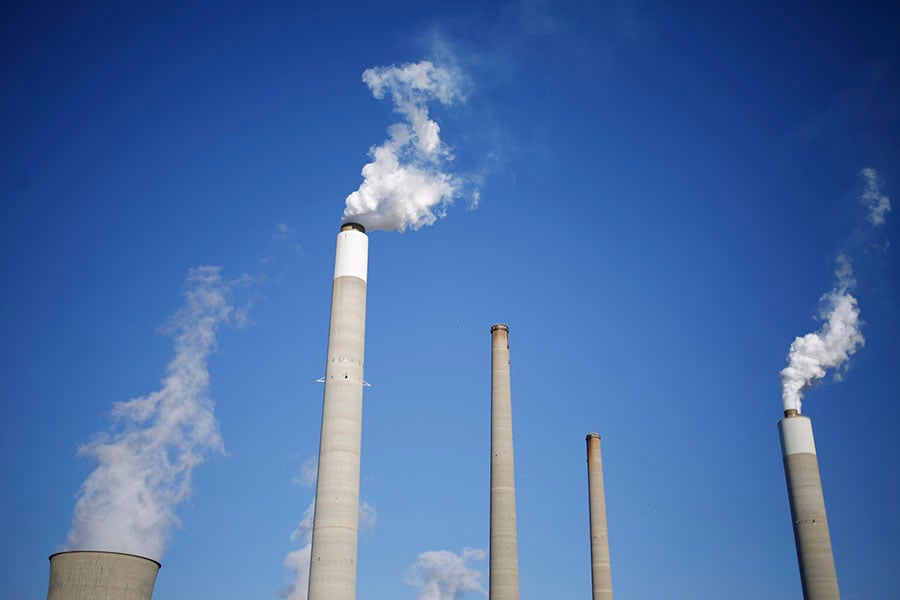

Retirement plans have a climate risk problem in the form of corporate bonds, according to data published today by As You Sow.
The group, which has added a feature to its Invest Your Values website that adds bond analysis for curious 401(k) savers, says that the fixed income components of such plans have roughly twice the concentration of fossil fuel holdings as the equities within them. Invest Your Values includes analysis on 43 retirement plans, most of which are 401(k)s sponsored by S&P 500 companies, and As You Sow plans to add five to 10 more per month going forward.
The participant groups with the most exposure to lending for fossil fuel projects are retirees and near retirees, the organization found. Those savers tend to have more of their portfolio allocated to fixed income, especially if they keep assets in their employer-sponsored plan and are in investment options such as target-date funds.
“Employees are unknowingly lending their money to expand fossil fuel operations,” said Andrew Montes director of digital strategies at As You Sow. While bonds are generally thought of as less risky from an investment returns point of view, the global warming associated with lending to oil and gas businesses increases the risk that retirees will be living a world more impacted by climate change, he said.
“There are very few alternatives for bond investors that are looking for climate-safe options,” he said.
Although plans often have Treasuries or municipal bonds within their funds, the corporate bond options are almost always exposed to the fossil fuels industry, he said.
To analyze the plans, As You Sow uses data from Department of Labor Form 5500 filings, which are usually at least a year old and contain annual information about large 401(k)s. That information was cross-referenced with data on the mutual funds in those plans.
Among the 43 plans, there were a total of 36 bond funds used, showing that many of the same options are used by different employers.
Although plans have a much higher exposure to fossil fuels through stocks, the concentration of fossil fuels within corporate bonds is higher than that of stocks, As You Sow found. For bonds, the average fossil fuel exposure is 0.5%, compared with 6.2% for stocks. But the concentration of fossil fuels within those are 15% for bonds and 8.6% for stocks.
Among defined-contribution plans across the country, about $46.5 billion in assets are lent to oil and gas companies to expand their operations, Montes said.
“We’re asking [plan administrators] to add climate-safe bond funds” that are diversified, he said.
“These asset managers need to be hearing from their corporate 401(k) clients that this is something their [participants] are asking for.”
Of the plans examined, the State Farm 401(k) had the highest bond fund exposure to fossil fuels, at 0.76% of assets, and a concentration within the bond funds of 14%, according to As You Sow.
The plan with the highest bond-fund fossil-fuel concentration was the Quanta Services 401(k), at 19%, with that plan having a 0.63% exposure.
The plans with the lowest exposure were those of Tesla and Twitter, at 0.24%, with concentrations of 18% and 16%, respectively. The Qualcomm 401(k) had the lowest concentration, at 11%, and an exposure of 0.35%.
The site also includes data on the 10 biggest target-date series in the U.S., which can help people who are not in the plans available analyze their investments, according to As You Sow.
Among the target-date funds, the TIAA-CREF Lifecycle series had the highest exposure to fossil fuels across stock and bond holdings, at over 7% for its 2025 vintage. The series with the lowest exposure in that vintage was the BlackRock LifePath ESG Index Series, at about 5%.
Separately from the new analysis tool, As You Sow has brought shareholder resolutions at companies including Amazon, Netflix and Comcast, asking those businesses to report on climate risk related to their retirement plans.

Since Vis Raghavan took over the reins last year, several have jumped ship.

Chasing productivity is one thing, but when you're cutting corners, missing details, and making mistakes, it's time to take a step back.

It is not clear how many employees will be affected, but none of the private partnership's 20,000 financial advisors will see their jobs at risk.

The historic summer sitting saw a roughly two-thirds pass rate, with most CFP hopefuls falling in the under-40 age group.

"The greed and deception of this Ponzi scheme has resulted in the same way they have throughout history," said Daniel Brubaker, U.S. Postal Inspection Service inspector in charge.
Stan Gregor, Chairman & CEO of Summit Financial Holdings, explores how RIAs can meet growing demand for family office-style services among mass affluent clients through tax-first planning, technology, and collaboration—positioning firms for long-term success
Chris Vizzi, Co-Founder & Partner of South Coast Investment Advisors, LLC, shares how 2025 estate tax changes—$13.99M per person—offer more than tax savings. Learn how to pass on purpose, values, and vision to unite generations and give wealth lasting meaning
